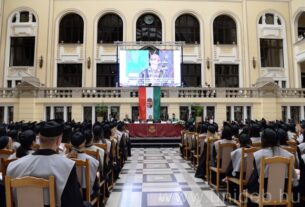Approximately one hundred people studied and took exams at the Summer University of Debrecen in one month: fifty-two received certificates after the first two-week course, and forty-three after the second two-week course. The tests were usually written, but anyone who wanted could testify orally about their knowledge.
This summer, the main goal of the participants was to learn the Hungarian language, but in addition, those who had the time and energy could participate in a number of programs. Although more had to be postponed due to the rainy weather, bicycle tours, night sightseeing and walking in the Jewish quarter were also very popular this year.
The popularity of the Tuesday evening folklore programs has remained unchanged for decades: students not only learn the folk songs and dances of the given region, but also get to taste the food. In the first week, Hajdúság was presented, in the second week, the Transylvanian seat, in the third, Transdanubian Mezőföld, and in the fourth week, Moldovan songs and dances were on the program.
The institution tries to come up with new programs every year. This year, on the occasion of Petőfi’s 200th birthday, the “Night of Poems” was announced, in the framework of which foreign students recited Petőfi’s poems. It seems that the love of poems and poetry unites people because several people stood up with the poems they chose, individually and in small groups. There were those who recited the Petőfi poem not only in Hungarian but also in their mother tongue.
Year after year, students come to the course who are not only interested in the language, but learn Hungarian because of their family roots and relatives.
There was a pair of teenage boys whose mothers were not only Hungarian, but from Hajdúszoboszló, and the two young men living in Ireland were able to spend their holidays with their grandmother from Szoboszló during the course. There was a German girl who found the name of her grandfather who was taken to the labor camp on the monument in Hortobágy, and there was one whose parents lived in Serbia and still spoke Hungarian at home. However, the “topper” is probably Zsuzsa Vitéz Fodor, who has been coming to Debrecen to study Hungarian for more than 40 years.
(unideb.hu)


















